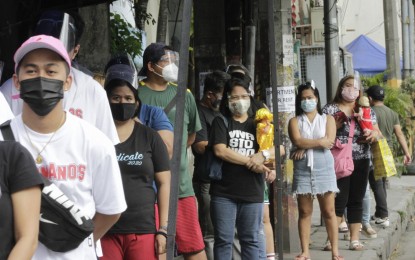
(PNA file photo)
MANILA – The emergence of different Covid-19 variants would always pose a threat and it is up to the people on how they will follow precautions and efforts to reduce transmissions.
Vaccine expert panel chair, Dr. Nina Gloriani, said Friday the world must have learned to live with the coronavirus disease 2019 by now.
“Nasa sa atin po iyan kung paano natin maiiwasan na dumami ulit yung kaso. Habang may mga kaso kahit sabihin nating bumaba iyan, meron at meron pa ring pag-uumpisahan iyang tramission ulit, iyong multiplication, 'yung mutation ng virus na iyan (It’s up to us on how we could prevent the increase in cases. While there are still cases, even if they go down, the transmission has always point of beginnings, its multiplications, the mutations of the virus),” Gloriani said in a virtual public briefing.
Gloriani said the recombinant Omicron XE variant, reportedly detected in the United Kingdom, is about 10 percent more transmissible than its Omicron parent, BA.2, but its biological mutation activity and behavioral characteristics are still being studied.
“We don’t really expect much difference kasi ‘pag konti lang ang mutation, hindi rin ganoon kalaki ang magiging change sa kanyang (because if it has fewer mutation, there’s no much change in its) behavioral characteristics. We do not know that yet so susundan na lang po natin iyan (we will follow it up),” she said.
Dr. Edsel Salvana, Department of Health–Technical Advisory Group member, earlier said there is always a possibility that the Omicron XE will enter the country.
In case it happens, Salvana said vaccines remain the most effective tools against the recombinant variant.
The World Health Organization (WHO) earlier said it is monitoring recombinant Covid-19 variants, including the XE Omicron hybrid, XD lineage (a combination of the Delta and Omicron variants), and the XE hybrid of Omicron sub-lineages BA.1 and BA.2.
The WHO assessment includes severity, impact on vaccine performance, and risk of reinfection. (PNA)
